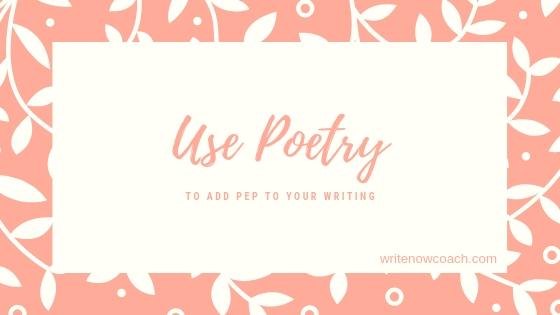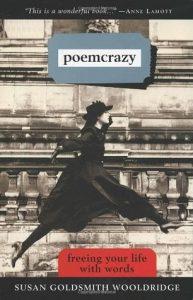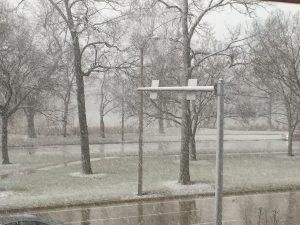Use Poetry To Add Pep to Your Writing
April 16, 2019
Note From Rochelle
Dear Writers,
I’m planning my next set of workshops and classes. If you have a class you’d love me to teach, send me an email with the topic: rochelle@writenowcoach.com
Today’s post talks about how to find and use poetic language in your writing—whether you’re penning a novel or an article.
Enjoy!
Rochelle

Use Poetry To Add Pep to Your Writing
by Rochelle Melander
Last week at dinner, a group of friends and I talked about Milwaukee Rep’s play, Things I Know to Be True. One of the women recited a line she remembered from the play. We nodded our heads—there was truth in the words. And poetry.
We find poetry everywhere: in books and television shows, on billboards and in magazines, in song lyrics and personal texts from friends. Today, many popular brands like Coca Cola and Microsoft are using poems as part of their ad campaigns because poetry captures our attention.
No wonder poetry grabs our attention. It addresses life’s challenges and puts them into words that express our emotions. When life is difficult, a poetic phrase can feel like a life raft.
As an entrepreneur and writer, I use poetry in everything I write, including blog posts, magazine articles, and website copy. Here’s how you can use poetry in your daily writing, whether you’re writing fiction, nonfiction or ad copy.
Collect Words
 In Susan Goldsmith Wooldridge‘s book Poemcrazy: Freeing Your Life With Words, she dedicated a whole chapter to “collecting words and creating a wordpool.” She says, “Words are lightweight, unbreakable, portable, and they’re everywhere. You can even make them up. … A word can trigger or inspire a poem, and words in a stack or thin list can make up poems.” (pp. 9-10)
In Susan Goldsmith Wooldridge‘s book Poemcrazy: Freeing Your Life With Words, she dedicated a whole chapter to “collecting words and creating a wordpool.” She says, “Words are lightweight, unbreakable, portable, and they’re everywhere. You can even make them up. … A word can trigger or inspire a poem, and words in a stack or thin list can make up poems.” (pp. 9-10)
You can collect words, too. Borrow them from books. Steal them from signs. Scribble down the words you overhear at the coffee shop and in the park.
Collect Poetic Phrases
Do you ever see or hear a phrase and think: that’s poetic! Artist and writer John Morse noticed poetic phrases in ads, crafted them into haiku poems, and posted them on the streets of Atlanta.
Here are two examples of his poems:
Build Personal Wealth!
In the Comfort of Your home!
Read to your children.
Lose ugly weight fast!
Feel Happier! Healthier!
Dump your bigotry.
Great stuff, eh? Morse’s Haiku poems have surprise endings. Even better, they make the reader think. Morse wrote ten of these haiku poems, made fifty copies of each, and posted them all over Atlanta.
Brainstorm Words and Images
When you have an experience or see something that grabs your attention, jot down the words that come to you. We’ve had two surprise winter snowstorms in the past week. During the first one, I happened to be at the library teaching Urban Wildlife: Poetry in Your Backyard with my colleague from the Milwaukee Public Museum. We watched the snow fall and brainstormed words and phrases to describe it:
 Blanket of snow
Blanket of snow
Cold
Swirling
Falling
Blowing
Try this
Gather delicious words. Collect phrases you hear and like. Brainstorm words to describe what you see. Keep your words in a journal, on your phone, or in a document. Before you write, read the words and phrases to gather inspiration. Or play with them—see if you can work them into your current writing project or even a poem.








